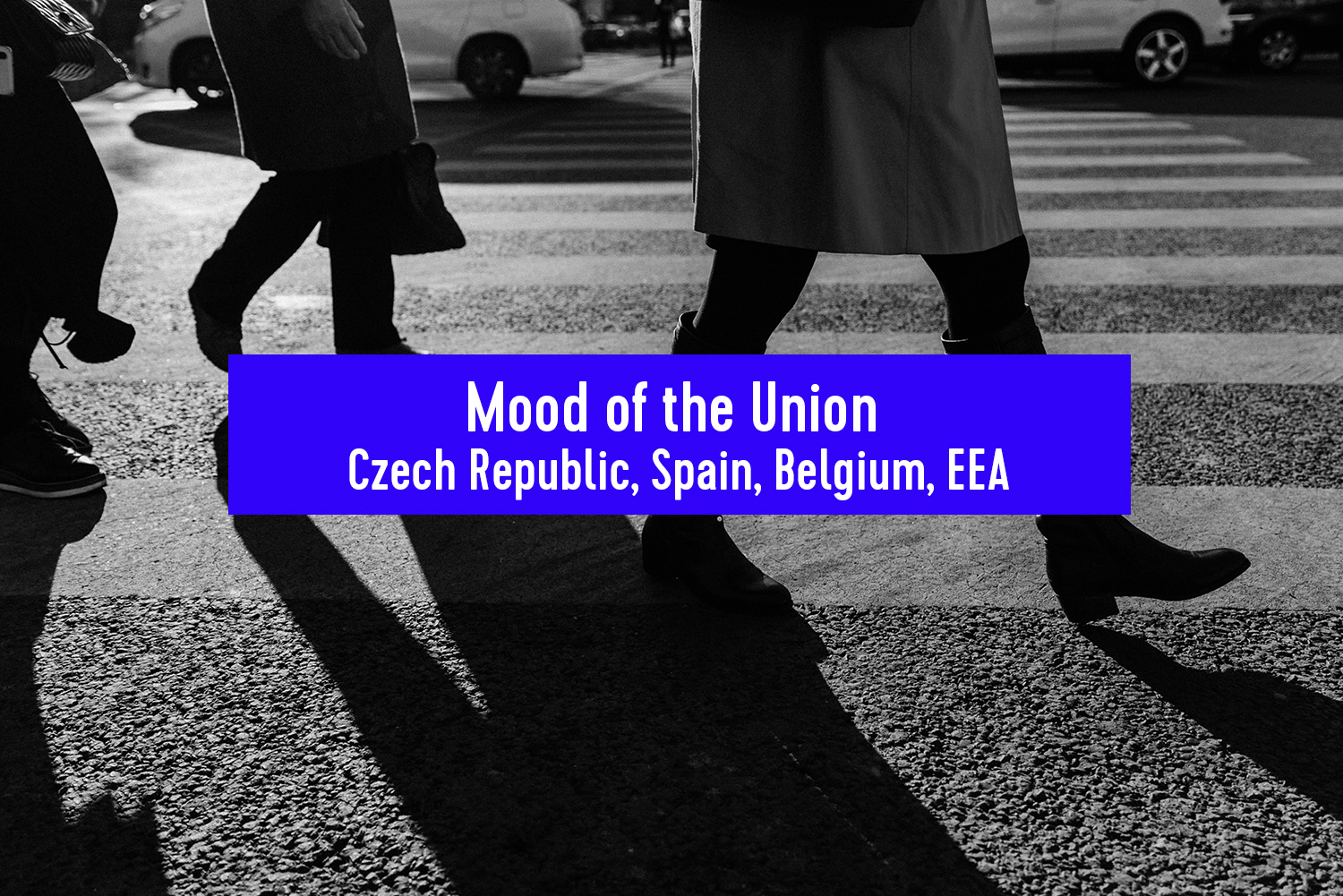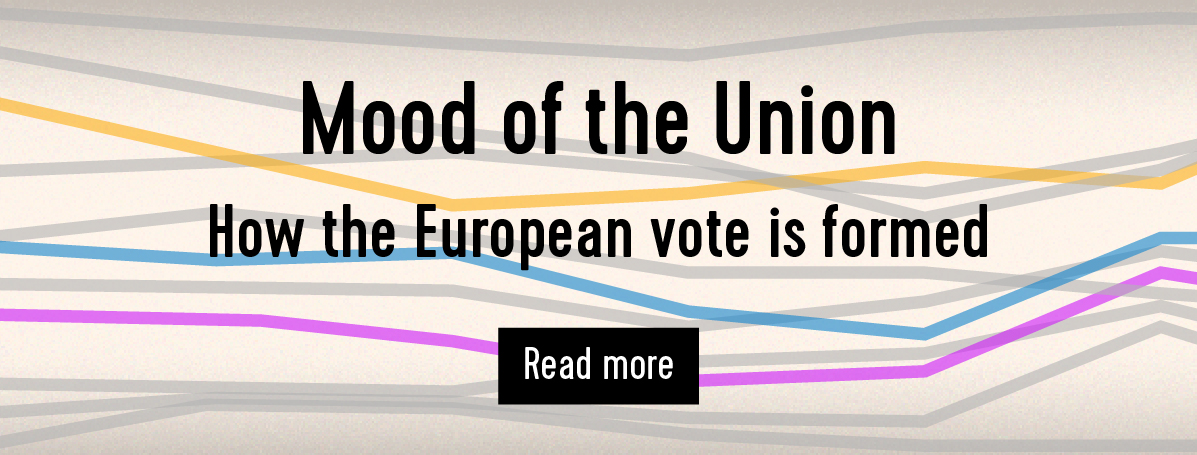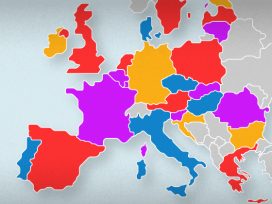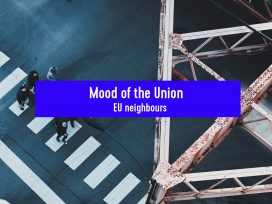It was the strongest Pirate Party in Europe that urged the European Commission to inform Czech voters of the misuse of European subsidies by their prime minister. Though the timing of the report on the matter left something to be desired, after May’s European elections Prague witnessed the largest public demonstration since the Velvet Revolution. That said, after the demise of the Left, the country’s political landscape has grown increasingly fragmented and polarized.
The same cannot be said of Spain, which returned the largest national component among the Socialist and Democrats in the European Parliament. An overwhelmingly pro-Europe sentiment persists, with populist offerings on both the Left and Right performing significantly less well than expected.
The green surge seen in many EU members states in May could provide further momentum to the prospect of Norway becoming Europe’s green battery, even if support for EU membership there has declined to well below 30 percent. Belgium on the other hand has experienced a red-green wave among the Francophone population and a wave of nationalism and xenophobia in Flanders. The divide continues to pose a threat to the country’s internal cohesion.

Photo by Steve Long on Unsplash
Czech Republic: Demise of the Left, rise of fragmented polarisation
Ondřej Slačálek, contributing author, A2, Prague
It was surprising just how much of a trouncing the Czech Left took in the EP election. The Social Democrats were the country’s major governing party from 1998 to 2006 and from 2014 to 2017, thereafter a minor partner in the government. In May they lost all of their seats in the European Parliament, receiving just 3.95 percent of the vote. The Communists received one seat instead of their previous two.
The only important politician connected with Czech social democracy to be elected to the European Parliament was Ivan David, a former minister of health. However, he was elected as the lead candidate of the nationalist Party of Direct Democracy, headed up by Czech-Japanese far-right entrepreneur Tomio Okamura. Two MEPs from the party collaborate with Marine Le Pen and other nationalists.
The oligarchic populist and his opposition
The winner of the elections was oligarchic populist Andrej Babiš, second richest man in the Czech Republic. His party received 21 percent of the vote. Babiš is very skilful at presenting rightwing centrist views in ways that attract former leftwing voters.
A combined 47.5 % of the vote went to four parties that wholeheartedly oppose Babiš: the neoliberal, soft eurosceptic Civic Democratic Party (ODS); the libertarian Pirate Party, which became a member of the Greens/EFA group; the neoliberal euro-optimist TOP 09; and the Christian Democrats. Thus the EP election confirmed and accelerated the two latest trends in Czech politics: both the demise of the Left and something that can paradoxically be called fragmented polarization.
One key election issue was dual standards regarding food. This issue was somehow symbolic, a substitute for the sense of a second-rate semi-peripherical status within the EU that is articulated, for example, by trade unions in debates on wage differences. No party was able to articulate a programme that addressed this situation, or present Czech voters with practical solutions like Piketty’s proposal of ‘saving Europe from itself’.
Misuse of European subsidies
The Pirate Party urged the European Commission to inform Czech voters of Babiš´s misuse of European subsidies prior to the election. A report on the matter arrived one week after the election in the form of a confidential draft sent to the Czech Finance Ministry for comment. It was immediately leaked, provoking an escalation of public protests against Babiš. On 23 June, Prague witnessed the largest demonstration since the Velvet Revolution (around 250,000 demonstrators).
Charges of misusing European subsidies have dogged Babiš for a long time. As the amount of supporting evidence grows, it has become a truly hot topic, as has the quality of democracy thirty years after a democratic revolution that yielded neoliberal results.
An optimistic tragedy, a pessimistic farce
We can expect further rounds of protests during the anniversary of the Velvet Revolution (after the optimistic tragedy, a pessimistic farce?) and further defeats of the weak and compromised Left. And maybe also the integration of neoliberal and Christian democratic parties under the banner of ‘defending democracy against populism’.
The strong position of the Pirate Party (the strongest in the EU, second in the opinion polls and with three MEPs) may also be a source of uncertain hope, because this idealist, anti-corruption and modernist party can be (almost) anything.
Compare figures of governance effectiveness in Czech Republic, Spain and Belgium, against other member states and the EU average. More on the methodology here. Check out figures corruption, crime rates, education and employment data and further statistics of over two decades from EU member in our Mood of the Union infographics.
Spain: The prospect of solving things collectively
Daniel Gascon, Editor, Letras Libres, Barcelona
Just one month after the country’s general election, the European election took place the same day as local and regional elections. The Socialist Party (PSOE) won 32.8 percent of the vote and 20 seats, making it the biggest national component among the Socialists and Democrats. Though the traditional centre-right Popular Party returned its worst EP election result ever, seeing its number of seats reduced by a quarter to 12, the party’s performance was still an improvement on that in the general election. Ciudadanos on the other hand, another centre-right offering, received a larger share of the vote (12.18 percent) than it did in 2014.
Overall, pro-European forces can be said to have secured a clear victory over eurosceptic forces like Podemos, support for which increased only slightly (10.08 percent), and the far right, with the Vox party performing nowhere near as well as forecasted (6.2 percent).
Pro-independence Catalan parties fielded candidates who are facing criminal charges in the wake of the Catalan independence referendum of 2017, including Oriol Junqueras and Carles Puigdemont, who is currently living in exile in Belgium. In doing so, they narrowed the scope of their ambitions from secession to the desire to avoid the penalties for breaking Spanish and Catalan law in the wake of Spanish Constitutional Court rulings concerning the referendum. Meanwhile, these politicians tend to inspire nationalistic or xenophobic sympathies, with distinctly europhobic tones entering into many of Puigdemont’s statements.
Pro-European sentiment outlasts Spitzenkandidat system
There was widespread dismay in Spain at the failure of the Spitzenkandidat system. The larger and more powerful member states were generally able to impose their interests, with some choices perceived as concessions to the Visegrád Group. There was some criticism of acting Prime Minister Pedro Sánchez, who led negotiations for PSOE but failed to do much about this. That said, the election of PSOE member Josep Borrell as High Representative for Foreign Affairs was celebrated. Yet there was an apparent contradiction in PSOE’s approach: while in Spain it has tried to build an alliance with Podemos, using leftist rhetoric and opening up new fronts in the culture wars, in Europe it seems to be taking a more centrist and systematic approach.
Spain’s recent flurry of elections may not be over yet. Given the problems the country now faces in forming a government, a fourth general election in four years cannot be ruled out. Meanwhile, the EP elections have confirmed beyond doubt that Spanish voters remain consistently pro-European. Domestic politics may tend to set the agenda, but the most pressing challenges can only be solved collectively: the effects of Brexit, which will be significant in Spain; the refugee crisis; technological developments and their effects on the job market; troubling economic prospects; and climate change.
Unemployment rates in Belgium, Czech Republic and Spain since 1991, compared with other member states as well as against the EU average. Check out figures of governance effectiveness, crime rates, education and health care data and further statistics of over two decades from EU member in our Mood of the Union infographics!
Neighbourhood: Norway as Europe’s Green battery?
Remi Nilsen, Editor, Le Monde diplomatique (Oslo)
The unexpected green surge during the EP elections has added another dimension to the debate about Norway’s relationship to the EU, which still simmers despite the country having already held two referendums (1972 and 1994) and public support for membership steadily declining in polls during the last decade to well below 30 percent.
Nonetheless, together with Iceland and Lichtenstein, Norway has become integrated in the Union since the 1994 EEA Agreement. The reluctance of Norway, as well as Iceland, to opt for full membership hinges on the fear of losing control of abundant natural resources – fish, oil and gas, and hydropower – as a result of forced privatizations subject to European market regulations.
An increasingly green EU
Thanks mostly to its hydropower capacities, Norway is more or less self-sufficient in terms of clean sources of electricity. At the same time, the country is one of the world’s primary exporters of greenhouse gases in the form of oil (12th biggest exporter) and gas (2nd biggest behind Qatar). Since 1990, Norway’s own greenhouse gas emissions have increased by 3.4 percent (2018), in sharp contrast to neighbouring Sweden (down 25.5 percent) and the EU as a whole (down 21.7 percent as of 2017).
The need to shift away from exporting non-renewables to clean energy has recently prompted the ambition of turning Norway into ‘Europe’s green battery’. Onshore wind farms along Norway’s 29,000 kilometers of breezy coastline constitute a key component here. The new wind farms have sparked protests from conservationists and local communities, but also hostility from consumers who fear an increase in traditionally low electricity prices: with the EU Commission’s fourth energy package, the export of clean energy will necessitate full integration into the European electricity market.
Over the last decade, Norway’s right- and leftwing governments have failed miserably in reducing greenhouse gas emissions and weaning the Norwegian economy off dirty energy exports. An increasingly green EU might help the pro-European camp shift the lingering low-intensity membership debate away from the old stalemate between ‘nationalist’ opposition to the EU and ‘neoliberal’ pro-Europeans.
Belgium: The great divide
Renaud Maes, Editor-in-Chief, La Revue nouvelle
After the European elections, two major tendencies dominate Belgium’s political landscape. These are shaped by a moderate red-green wave among the Francophone population and a rather more concerning wave of nationalism and xenophobia in Flanders.
The red-green wave propelled the Francophone Greens (ECOLO) to win a 7.8 percent share of the vote (up 2.9 percent) and two seats in the European Parliament. Meanwile, the Francophone Worker’s Party (PTB) received 5.57 percent and its first ever seat in European Parliament.
Of course, globally, the three traditional parties are widely perceived as being unable to tackle ecological challenges. The traditional Francophone liberal and socialist parties have both lost a significant amount of support, a trend that also applies to some extent to the Francophone Christian democrats.
In the case of the liberals, this can be explained by their participation in the previous federal parliament, which made reforms and used discourses perceived by many French-speaking voters as coming far too close for comfort to the Flemish nationalist agenda. The party’s aggressive use of YouTube videos aimed at the Francophone Greens but based on fake news may have inadvertently lent the ecological debate an even more central significance.
However, the Greens did themselves no favours with a flyer that was received as being too communitarian and complacent towards Islamic radicalism, causing a media storm that undoubtedly cost them votes among antireligious circles in particular.
The Left united in its strong criticism of the European Union’s ‘neoliberal agenda’, with a focus on trade treaties, the European Stability Mechanism and the policies of the European Central Bank. It seems that a majority of Francophone voters supported these criticisms – reflected in the successful showing of figures such as the socialist Paul Magnette, a fierce opponent of CETA and an advocate of a ‘social Europe’.
The spread of populism and xenophobia in Flanders
As for Flanders, with the exception of Brussels, the extreme rightwing Vlaams Belang party won 12 percent of the votes, an unexpected increase of no less than 7.7 percent that propels it from one to three EP seats and second place overall. The radical right Flemish nationalists of the New Flemish Alliance (NVA) topped the table with 13.73 percent, slightly down on 2014’s results. Between them, the two parties won the support of half of all Flemish voters. However, rather than reflecting a pronounced Euroscepticism, this has more to do with widespread criticism of the country’s immigration and security policy.
Thus Vlaams Belang (VB) invested heavily in a Facebook campaign emphasizing ‘the loss of European values’ and targeting the Flemish youth in particular. VB also received further media coverage for listing the young Dries Van Langenhove as a candidate in the country’s federal election, which was held the same day as the EP election. Van Langenhove is the founder of the ultra right ‘Schild & Vrienden’ group and under investigation for its distribution of neo-Nazi propaganda. Nevertheless, he now enters the federal parliament, having attracted significant support.
Critical voices
Critique of the EU is alive and well in Belgium, but varies depending on where you look. Flanders is in the grip of the populist, xenophobic wave that has washed over all of Europe, taking a very hard line on immigration and promoting political personalities who have little respect for European legislation and the Universal Declaration of Human Rights when it comes to migrants. The Francophone population is increasingly focusing on the EU’s neglect of social and ecological issues. Such divides continue to invite the impossible prospect of the country’s implosion.

‘Mood of the Union’ is published by Eurozine and sponsored by the ERSTE Foundation and the National Endowment for Democracy.









